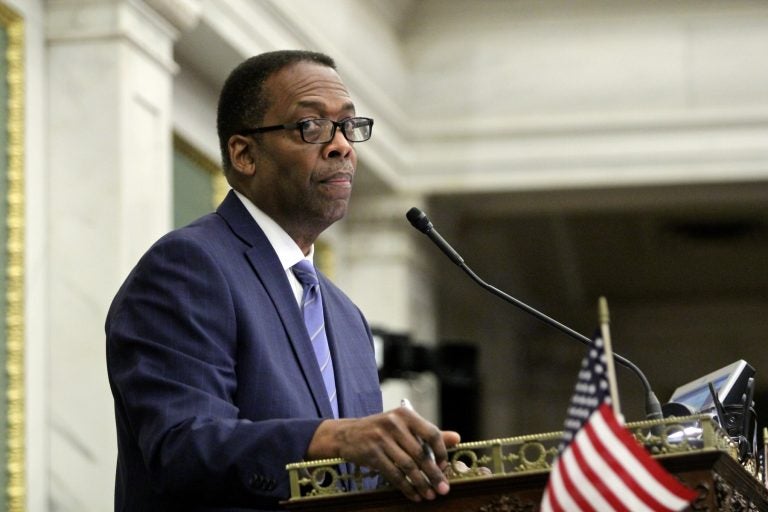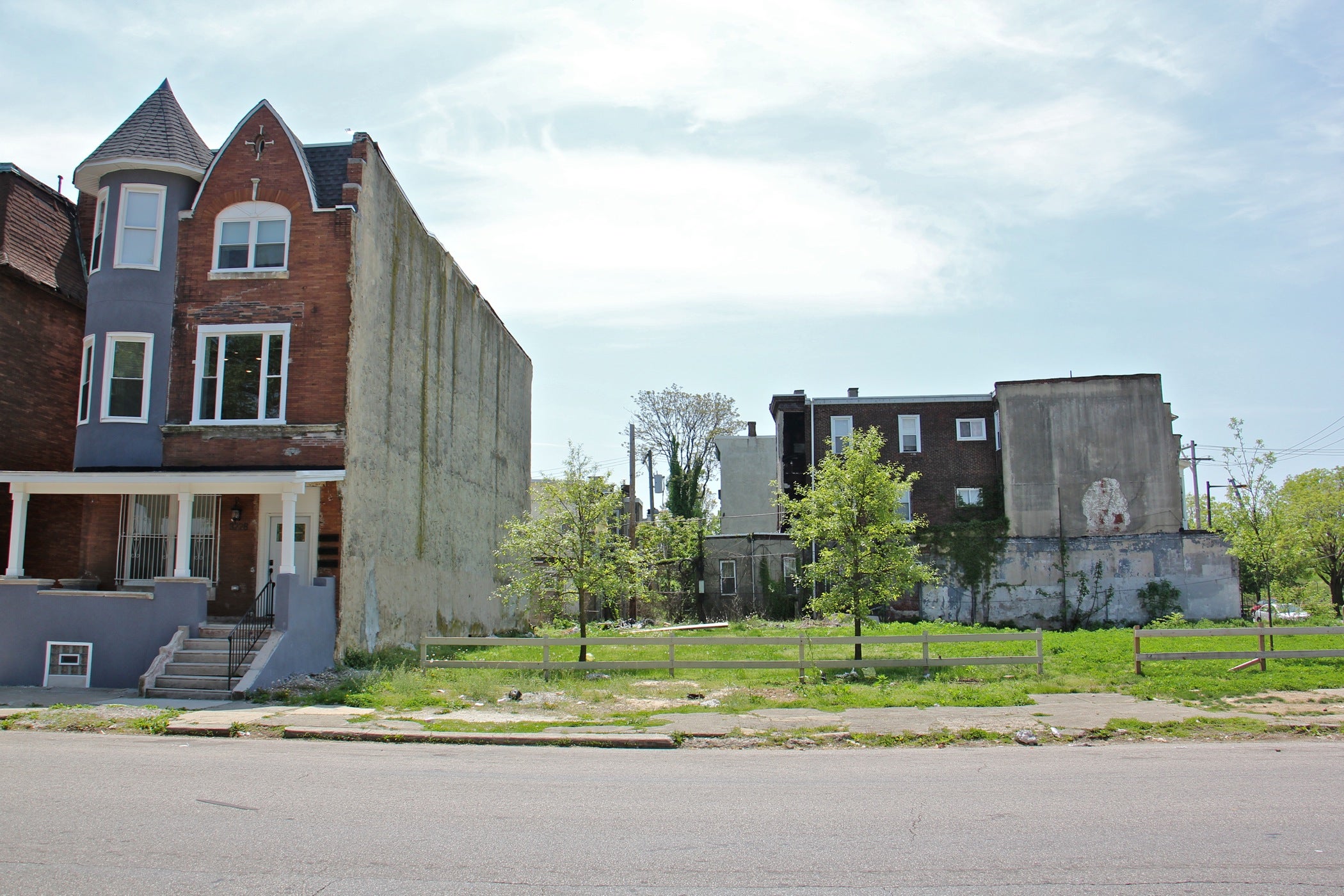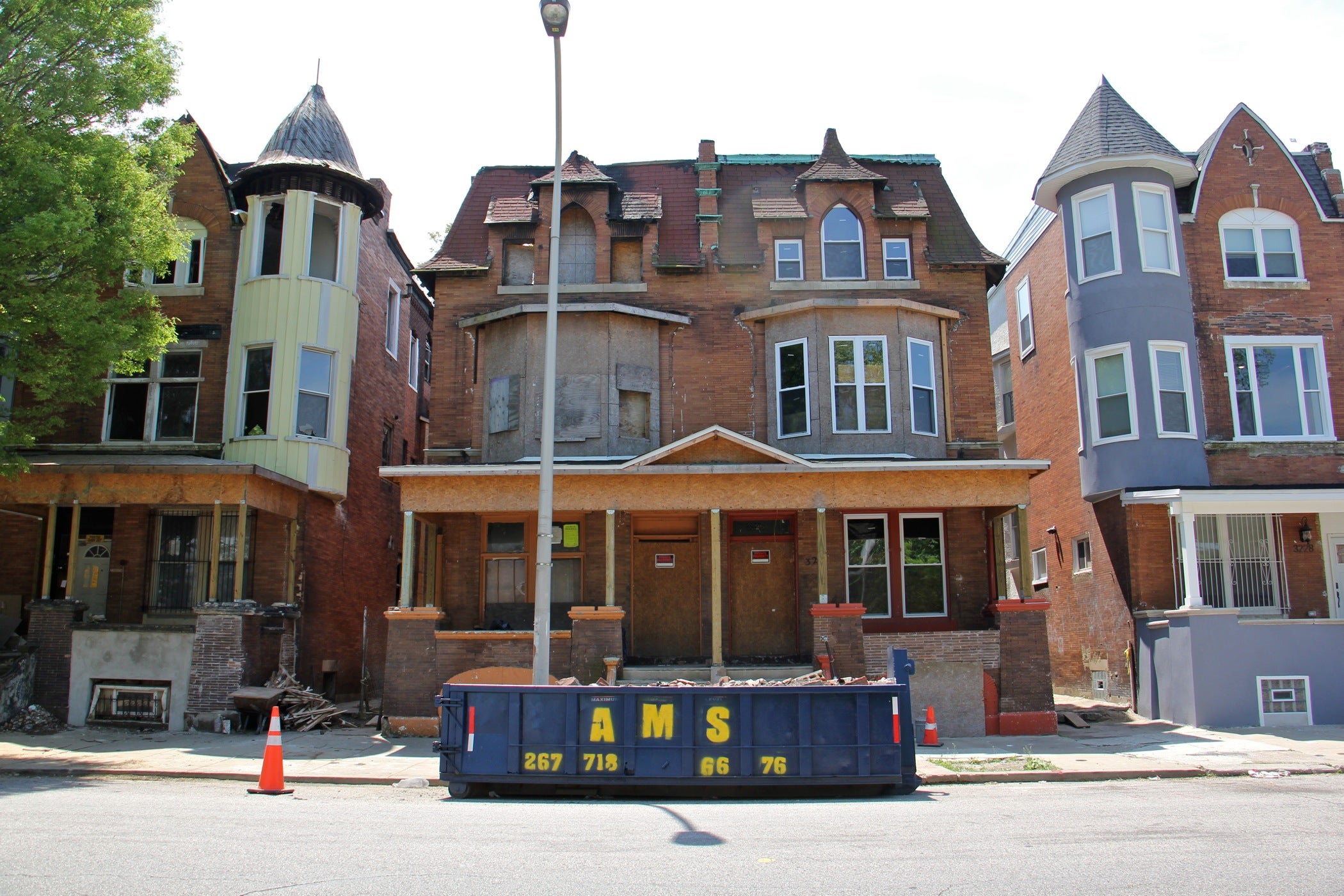How City Council President Darrell Clarke stopped housing from rising on a vacant city lot and helped his landlord
Philly Council President Darrell Clarke intervened in a city land sale to help the developer who leased him space for his district office at a reduced rate.

City Council President Darrell Clarke. (Emma Lee/WHYY)
Do politically connected developers get a do-over when they lose out on a city land sale?
The days when City Council members simply steered public land to chosen developers are supposed to be over, replaced by a more objective bidding system that favors projects with community benefits, like affordable housing. But the saga of one vacant lot, pushed to bid by Council President Darrell Clarke, shows that Philadelphia’s recent pivot toward more of these competitive bids is still vulnerable to political interference.
Emails obtained by PlanPhilly show that Clarke staffers took steps to help one developer, Mudasiru Adedokun, acquire a valuable piece of city land while derailing another developer’s plan to put housing — including a few affordable units — on the lot. Clarke’s office acted just weeks after Adedokun agreed to lease space for a new district council office at a heavily discounted rate.
Adedokun had long sought to build a strip mall on the city-owned lot in Clarke’s district. But the parcel he wanted at 33rd and Diamond streets, just a few steps from Fairmount Park, wasn’t for sale. The seemingly prime Strawberry Mansion land had never gotten the green light needed for sale from Clarke, despite its decades-long vacancy.
That changed last year, a few weeks after Clarke’s staff agreed to lease space for a new satellite office in an existing strip mall owned by Adedokun. The Montgomery County-based landlord rented the council office its new space at a 45% discount from its list price.
In August 2018, a staffer for Clarke asked the Philadelphia Redevelopment Authority to put the property his office’s new landlord wanted up for competitive sale. Adedokun responded to the PRA request for proposals with an offer to build a one-story strip mall on this site, seeking a letter of support from Clarke’s office.
But there was a snag. The PRA chose a competing plan — a plan for apartments that would help the agency meet city goals to convert vacant land into affordable housing.
The apartment developer offered to pay six times more for the land than Adedokun and promised to include several units priced at below-market rates.
Even though Clarke has repeatedly campaigned for more affordable housing during his 20-year tenure on Council and the lot is zoned as residential, his office was displeased by the PRA decision. Almost immediately after learning Adedoken wouldn’t get the land he wanted, the Council President asked the PRA to terminate the entire sale process and take the lot off the market. The agency, which must get City Council approval on all public land sales, obliged.
Just a few months later, Clarke staffers wrote back again. Now, they wanted the agency to put the same Diamond Street property back up for sale. This time, the council office asked the PRA to rewrite its request for proposals to explicitly spell out a preference for a project that would include ground-floor retail — a description that favors Adedokun’s rejected strip-mall concept.
Adedokun directed questions about the land deal to his attorney, Marc Snyder. He acknowledged that they were preparing to submit the same strip mall proposal all over again, but pleaded ignorance to the puzzling circumstances surrounding the two bidding processes.
“The city said they withdrew the project and they were going to reoffer it,” Snyder said. “We did think it was a little suspicious.”
Today, nearly a year after Clarke’s initial sale request, the land remains vacant, one of many empty lots neighborhood leaders want to see restored to productive use.
“It’s a heavily trafficked area and our gateway to the park,” said Tonetta Graham, the head of Strawberry Mansion Community Development Corporation and a longtime neighborhood resident. “It would be great if we could add a commercial benefit.”
A form of councilmanic prerogative that costs the city

Clarke’s office now says it nixed the apartment plan because it lacked a retail component. Yet the slighted apartment developer said no one ever told him about that preference. The emails obtained by PlanPhilly show that the Councilman’s officer never mentioned any preference for shops or commerce in any of their correspondence with the PRA about the residentially zoned lot.
Jane Roh, a spokeswoman for Clarke, initially asserted that her office was never informed of Adedokun’s competing proposal. In fact, a Clarke staffer forwarded an announcement of the PRA request for proposals to strip mall developer, the emails show. Following that initial tip, Snyder, Adedokun’s lawyer, repeatedly contacted the office about the proposal.
Akira Drake Rodriguez, a fellow at the University of Pennsylvania’s Department of City and Regional Planning, described the episode as yet another example of the “unfair land deals” that have plagued the city’s management of thousands of vacant lots it owns. She said the Diamond Street saga echoed other unusual sales influenced by council interference, like a deal to steer lots to a student housing developer at an inexplicably discounted price.
Rodriguez said this atypical level of council involvement — a form of councilmanic prerogative — costs the city and its residents.
“This is a loss of property tax revenue. It’s a loss of quality of life for the residents who could have been living there now. It’s a loss of economic development,” she said. “And for what? Because you knew this other developer? Or because they didn’t want more affordable housing?”
Tonetta Graham heard the Diamond Street lot was slated for redevelopment last year. Several interested developers even approached her office to make their pitches, including Adedokun and an associate.
Graham said she was supportive of his commercial proposal for the Diamond Street lot. But even if another project went up, she would be happy to see a choice parcel finally headed for redevelopment after decades of vacancy.
As far as she is aware, one of the developers who had expressed interest in the land was still gearing up to develop it.
“I think it has been awarded to someone,” Graham said. “But they haven’t come back to me with their plan.”
Housing project deemed “unacceptable” for vacant residential lot

Adedokun started developing real estate in Clarke’s district over a decade ago. The Montgomery County businessman’s first foray began in 2007, when Clarke introduced a council resolution to turn over city-owned lots in the Strawberry Mansion neighborhood to an arm of the Philadelphia Industrial Development Corporation for redevelopment. PIDC, in turn, sold the land to Adedokun for a strip-mall project called Sedgley Plaza.
The plaza opened in 2012 with a Dollar General store as the anchor, financed with subsidized loans from PIDC. With that success under his belt, Adedokun began eyeing other city properties in the surrounding Strawberry Mansion neighborhood to build another strip mall, according to Snyder.
At some point, he settled on the Diamond Street lot and, by 2018, Adedokun was ready to make a purchase. But, like hundreds of other public properties, the lot was in a holding pattern without any push toward sale by the city. And, since Adedokun’s first strip-mall project, the PRA had crafted new policies that barred so-called directed sales, in which council members hand-pick winners for redevelopment deals.
In July 2018, Clarke’s office and the city’s Department of Public Property leased out 1,600 square feet of space in a vacant bay at Sedgley Plaza for just $1,597 a month. Unlike some of his colleagues, Clarke had not previously devoted money from his council budget for a satellite office in his district. But the terms of the lease Adedokun was willing to agree to were generous.
A leasing agent told PlanPhilly that identical units in the plaza typically rent for approximately $3,000 a month. At its normal price, the unit would have exceeded the city’s $20,000-a-year cap on council office expenses by nearly $16,000. The price Adedokun agreed to brought that annual cost to just below this cutoff.
A few weeks after the lease was signed, Michael Koonce, Clarke’s director of special projects, emailed the PRA requesting that the Diamond Street lot go up for sale. Then on Sept.18, PRA emails show, Koonce forwarded Adedokun the PRA announcement of the RFP. The email hit the developer’s in-box four days after PRA sent an email blast to potential developers and others in its database about the land sale. The agency, however, was still getting the word out when Koonce sent his email. It would be another two days before the land-holding agency’s communications team advertised the sale on social media, according to internal documents.
Koonce expressed prior knowledge of the developer’s interest in the Diamond Street properties in the email to Adedokun and a PRA project manager. He noted Clarke’s inability to steer the land to him directly.
“The City’s disposition policy requires that the land be conveyed via a competitive bid process,” Koonce wrote to Adedokun. “Since you had previously expressed interest in developing this parcel, I am forwarding a link to their competitive bid process.”
Unsaid in Koonce’s email was that Philadelphia’s city charter requires council approval for public land sales, with deference given to district council members due to councilmamic prerogative. Any deal for the Diamond Street lot depended on Clarke’s approval.
Records show 22 other individuals had previously submitted expressions of interest for the Diamond Street lot. None of these other potential developers received emails from Koonce or other Clarke staffers, PlanPhilly found.
By the Oct. 15 deadline for RFPs, Adedokun had drawn up plans to construct a 5,100-square-foot strip mall dubbed “The Retail Center at 33rd & Diamond.” The proposal included a small retail space and a larger proposed convenience store, along with parking. He offered the PRA $50,000 for the 10,000-square-foot lot.
On a tax clearance form, Adedokun explicitly listed a conflict of interest — “Councilman Darrell Clarke is a tenant of one property I own.” But if PRA officials noticed this disclaimer, it went unremarked on.
As the agency reviewed this and two competing redevelopment proposals, Snyder, the lawyer working on Adedokun’s behalf, emailed a November request for a status update on the bidding process to Clarke staffers. Koonce and Clarke’s office manager, Zenobia Harris, were included on that email.
In early December, the PRA passed over Adedokun’s proposal in favor of a $300,000 offer from the PG Building Group to buy the lot and construct a 20-unit apartment building. The agency scored the two bids and ranked them similarly, but the PRA’s scoring rubric gave extra points to PG Building for its inclusion of seven units of affordable housing. A rental sheet listed affordable units at $500 a month, along with accompanying market-rate units ranging from $900-a-month studios to $1,470-a-month two-bedroom units.
Clarke, who has since introduced legislation seeking to zone out apartment buildings from his district, did not agree with the PRA’s decision. Four months after he asked the PRA to sell the lot, Koonce requested that the agency reject the PG Building Group proposal and take the land back off the market — a move that would almost certainly prolong vacancy.
“After reviewing the bid sheet with … staff, including Councilman Clarke, I am writing to inform you that our office finds all the proposals unacceptable,” Koonce wrote to the PRA, in early December 2018. “We would now like to consider a community use for the parcel.”
That “community use” would never materialize. Asked about Clarke’s objections to the apartment proposal, Roh said in April of this year that the market-rate units were too pricey, and that the developer had winnowed down the affordable-housing component to just four units.
But, she said, Clarke’s office’s primary concern was the absence of “community retail.”
“The developer was proposing mostly market-rate units unaffordable to near residents without offering much to the community in return,” Roh said in an email. “If you have a public park with no near business where people can get a cold beverage on a hot day, you want to see properties marketed for potential use for a convenience store.”
Tom Peters, owner of PG Building Group, said no one ever relayed Clarke’s interest in a retail use to him. Paul Chrystie, a spokesman for the PRA, said Clarke only mentioned this preference in April of this year, after he requested that the city kill the PG Building proposal and relist the lot a second time. The parcel remains zoned for housing.
A changing story from Clarke’s office

Roh has maintained, on several occasions, that the office was unaware even of Adeokun’s interest in building a strip mall on this land.
“Our office was told that the top-scoring proposal was worth consideration,” she said. “Only the top-scoring response was discussed with Mike Koonce.”
But Koonce’s emails with Snyder seem to contradict this account. The lawyer also said that he had obtained support from Clarke’s office for the retail plaza proposal.
“I don’t know how formal it ended up being, but we were told to get a letter of recommendation from them,” Snyder said.
At a June Council meeting, Clarke acknowledged that he did, in fact, know about Adedokun’s interest in the land. But after the meeting, Clarke returned to his chambers and refused to answer any further questions about the development proposal.
Roh later clarified that Clarke had meant to say that he had only become aware of the developer through inquiries from PlanPhilly. But in a final email, Roh revised that story.
“Council President had awareness of this person as someone who is interested in redeveloping properties in the district,” she wrote. “But again, there is no connection between his interest in PRA properties and Public Property’s district office lease with him as far as the Council President is aware.”
Council members sometimes defend their involvement in city land sales by asserting that they are representing the community and ensuring that land heads toward equitable uses. But Rodriguez said the loss of an equitable use — affordable housing — in favor of a murky sale to a strip-mall developer raised questions about a district council members ability to serve this singular role.
She suggested the deference given to council members could be better diffused among neighborhood groups — like the registered community organizations (RCOs) that already weigh in on zoning issues — and professional planners.
“We could be using the things that are already here. We could build that into the RCO process and take the power away from the councilman,” she said. “It needs to be distributed between a couple of agencies and multiple people so there is no sole person in charge of land deals in the city.”
Correction: The article published on June 10, 2019 referred to an email sent by a Clarke staffer about the RFP for the Diamond Street lot. The article was corrected on June 20, 2019 to note that the email was a forwarded public announcement of the RFP. It was sent four days after the PRA sent an email blast about the RFP.
WHYY is your source for fact-based, in-depth journalism and information. As a nonprofit organization, we rely on financial support from readers like you. Please give today.







